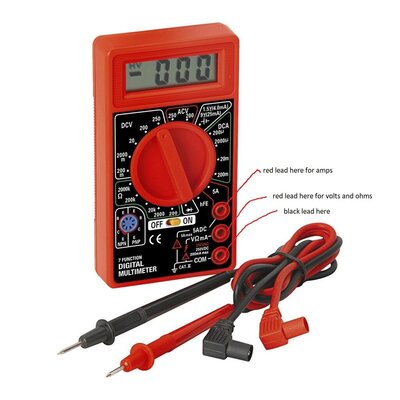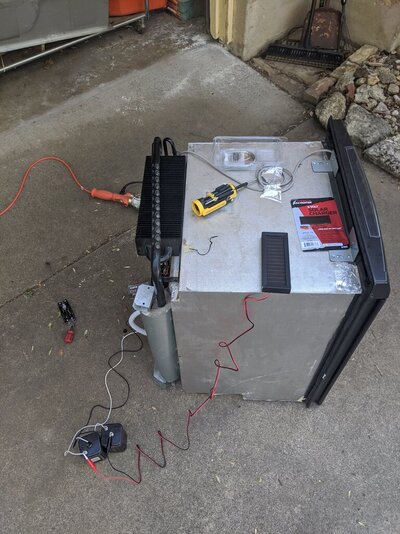no_pun_intended
Member
Recently bought a 3.3 cu 2020 Dometic 3-way fridge to put in my trailer. Something that's different from the '83 fridge that I pulled out of the trailer is that newer fridges apparently require a constant source of 12 volt power to run in any mode, even 120v or propane. Not only that, but measuring across the 12v terminals with a multimeter, it looks like this thing is drawing 5 amps! (which seems really high to me. someone please correct me if I have measured that wrong).
My plan was to get a fridge I could run off of propane and spend several days away from a power connection. But if this fridge consumes 60 watts an hour, thats going to kill my battery practically before it can even get cold. I'm in a bit of a pinch here, but thankfully I haven't gone in on my battery setup yet so I believe I can work around this. I was originally planning on a single 80 or 100ah battery, as my only other 12v amp draw is the water pump. So really, my questions are as follows:
1. What is the best way to provide constant 12v power to the fridge while off the grid?
Let's say I want to keep it going for a week. Should I invest in a larger battery bank? A couple 100W solar panels?
2. Is there any way to just bypass the 12v "brain" of the fridge?
This would be preferable if possible. I understand that the brain controls things like power source, coolness settings, and even propane pressure and the pilot light. But the older fridges were able to be run off of propane without power, as I understand it. I am decently handy, and would love some guidance on if this thing can be run without 12v.
3. Please tell me I am wrong about this thing needing FIVE amps.
I just keep coming back to this. How could such a small appliance (essentially just a PCB and some LEDs) eat so much power. This high power draw is what worries me about trying to run it off solar; it seems like I'd need to spend close to $1000 dollars just to power a fridge that takes half a day to get cold and could kill my battery entirely on a cloudy day.
My plan was to get a fridge I could run off of propane and spend several days away from a power connection. But if this fridge consumes 60 watts an hour, thats going to kill my battery practically before it can even get cold. I'm in a bit of a pinch here, but thankfully I haven't gone in on my battery setup yet so I believe I can work around this. I was originally planning on a single 80 or 100ah battery, as my only other 12v amp draw is the water pump. So really, my questions are as follows:
1. What is the best way to provide constant 12v power to the fridge while off the grid?
Let's say I want to keep it going for a week. Should I invest in a larger battery bank? A couple 100W solar panels?
2. Is there any way to just bypass the 12v "brain" of the fridge?
This would be preferable if possible. I understand that the brain controls things like power source, coolness settings, and even propane pressure and the pilot light. But the older fridges were able to be run off of propane without power, as I understand it. I am decently handy, and would love some guidance on if this thing can be run without 12v.
3. Please tell me I am wrong about this thing needing FIVE amps.
I just keep coming back to this. How could such a small appliance (essentially just a PCB and some LEDs) eat so much power. This high power draw is what worries me about trying to run it off solar; it seems like I'd need to spend close to $1000 dollars just to power a fridge that takes half a day to get cold and could kill my battery entirely on a cloudy day.


